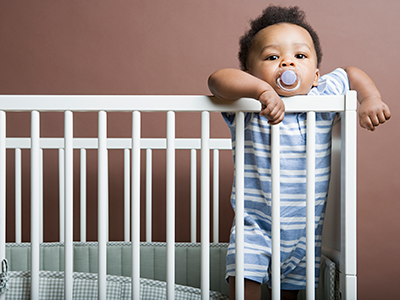As many caregivers know, sucking can help calm a fussy baby. Pacifiers are often used to help babies fall asleep, sooth anxiety and go through medical procedures, such as vaccination and blood tests. Pacifiers can also lower the risk for sudden infant death syndrome (SIDS) and sudden unexpected infant death (SUID). But you may have also heard that pacifiers are bad for your baby’s teeth. Here’s what you need to know.
What types of dental issues can be caused by pacifiers?
- Misaligned teeth: Excessive use of a pacifier can result in misaligned and crooked teeth. The intensity of sucking determines the severity and quickness of developing pacifier teeth, including underbite, overbite, open bite and crossbite.
- Pacifiers can serve as a reservoir for microbes: Their use is linked to oral yeast infections. One should ensure they are kept clean by sterilization/disinfection by boiling in water for 15 minutes or using an antimicrobial agent such as 0.12% chlorhexidine.
- Cavities: Dipping pacifiers in sweet substances — such as sugar, honey and corn syrup – can encourage plaque buildup and lead to cavities especially on the front upper teeth.
Are orthodontic pacifiers better than traditional pacifiers?
The short answer is NO. A typical orthodontic design mimics a natural nipple, which is flatter and square-shaped, as well as the motion that pulls milk from the nursing parent’s breast. Although orthodontic pacifiers are often marketed as dental-friendly for children, prolonged use can cause bite issues.
Will pacifier teeth eventually correct themselves?
Whether or not pacifier teeth correct themselves depends on when pacifier use is discontinued. If your child stops sucking on a pacifier early, there is a good chance their bite will correct itself. Detecting tooth misalignment and addressing the habit before your child turns 18 month old increases the chances of self-correction. By the age of four the misaligned teeth are less likely to shift back naturally which makes orthodontic appliances the only available solution for pacifier teeth.
A pediatric orthodontist may suggest one of the following appliances:
- Braces
- Clear aligners followed by retainers
- Tongue cribs
- Expansion of the upper jaw
- Vertical pull chin cups
- High-pull headgear
How do I get my child to stop using a pacifier?
The AAPD supports consistent messaging by medical and dental providers when educating parents on the risks of a prolonged pacifier habit as usage after 12 months. To reduce the risk of otitis media, also known as middle ear infection, the American Academy of Family Physicians (AAFP) and American Academy of Pediatrics (AAP) joint guidelines recommend reducing or stopping pacifier use in the second six months of life. Pacifier use beyond 18 months can influence the developing orofacial complex, leading including underbite, overbite, open bite and crossbite.
Here are some suggestions for weaning your child off their pacifier:
- Make sure your child feels secure and comforted so they do not resort to old habits.
- Distract your child with a favorite toy or activity when they ask for the pacifier to redirect their attention and ease their desire for the pacifier.
- Offer your child positive reinforcement when they are not with the pacifier for a period of time, such as a small toy.
- Ask your pediatric dentist to speak with your child about stopping. A child is more likely to comply with the advice or instructions given by a health professional.
Using a pacifier is not inherently harmful if you practice proper hygiene and are aware of when to wean your little one off them! It is also important to regularly monitor your child’s dental development and discuss any concerns with their pediatrician or dentist.
And remember: the AAP and AAPD recommend that patients should establish a dental home by age one!
 https://riseandshine.childrensnational.org/wp-content/uploads/2025/10/boy-with-mouthguard-feature.jpg
300
400
Danielle Robbins
https://riseandshine.childrensnational.org/wp-content/uploads/2017/11/childrens_riseandshine_logo.jpg
Danielle Robbins2025-10-15 14:56:352025-10-15 14:56:35What to do if your child knocks out a tooth: Emergency dental guide for parents
https://riseandshine.childrensnational.org/wp-content/uploads/2025/10/boy-with-mouthguard-feature.jpg
300
400
Danielle Robbins
https://riseandshine.childrensnational.org/wp-content/uploads/2017/11/childrens_riseandshine_logo.jpg
Danielle Robbins2025-10-15 14:56:352025-10-15 14:56:35What to do if your child knocks out a tooth: Emergency dental guide for parents




Leave a Comment
Want to join the discussion?Feel free to contribute!